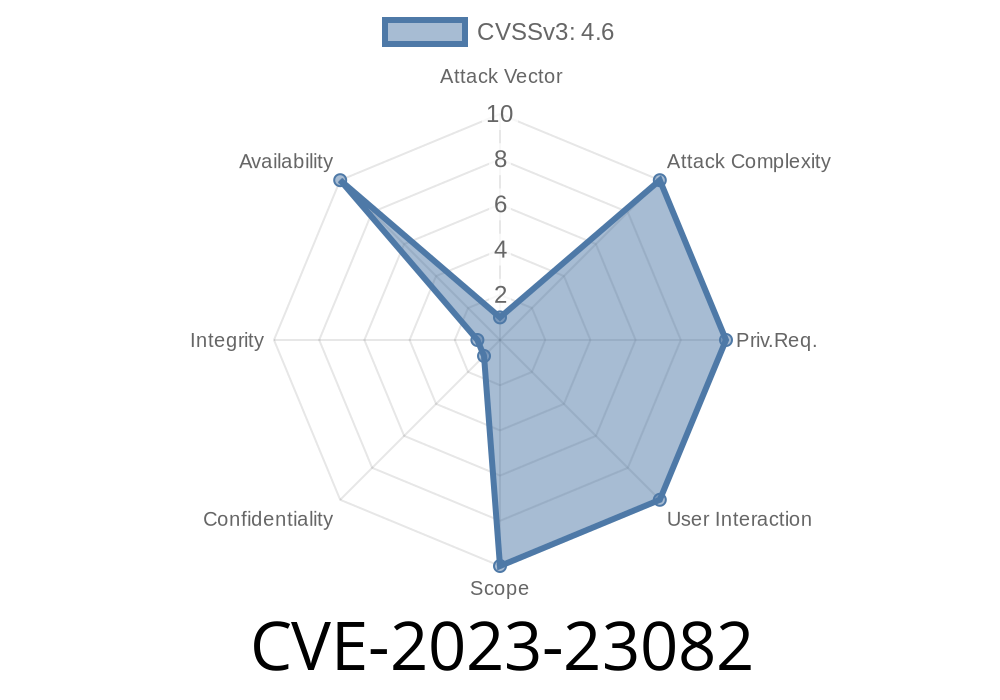Kodi is one of the most popular open-source home theater applications in the world. It lets you stream media, organize your videos, music, and more. However, even powerful platforms like Kodi are not immune to security vulnerabilities. In this post, we’ll go in-depth on CVE-2023-23082, a critical heap buffer overflow bug in Kodi up to version 19.5, and show you how it works.
1. What is CVE-2023-23082?
CVE-2023-23082 is a heap buffer overflow vulnerability found in Kodi up to and including version 19.5. Attackers can exploit this bug to crash Kodi or potentially execute code, just by passing a specially crafted value to Kodi’s internal functions. The cause? An improper check of the length for the value passed to the “offset” argument in certain components.
Vulnerability type: Heap buffer overflow
Affected product: Kodi Home Theater Software up to 19.5
Impact: Denial of Service (DoS), possibly remote code execution in certain cases
2. How does the vulnerability work?
Let’s break it down in plain English. Kodi’s C/C++ code has a function that lets you read or write data by specifying an offset — think of offset as a position in a file or string. If you provide an offset value larger than the allocated buffer, or if the code doesn’t check your value properly, Kodi can end up reading or writing memory it doesn’t own. That’s a buffer overflow.
Here, the bug happens in a function that deals with reading user-supplied data and using the 'offset' argument directly without checking if it's within bounds.
3. Sample Vulnerable Code
*Note: This is a simplification and not the actual Kodi code! It’s for illustration only.*
// Vulnerable function snippet in C++
void read_data(char *buf, int buf_size, int offset, char *input) {
if (offset < ) {
printf("Invalid offset\n");
return;
}
// Vulnerable: Missing check if (offset + strlen(input) > buf_size)
memcpy(buf + offset, input, strlen(input));
}
The problem here: if you pass a very large offset, the memcpy function will write outside the allocated buffer (buf). That’s a heap buffer overflow.
If buf is 100 bytes, and you set offset = 99 and input = "AAAAA", the code will write 4 bytes beyond the end.
Step 1: Find an entry point
Let’s say Kodi exposes this code through its web interface or through parsing a playlist or settings file.
An attacker prepares a specially crafted file or request
{
"offset": 99999,
"input": "crashme"
}
When Kodi processes this, it calls the vulnerable function with a huge offset. This causes a crash — denial of service. Sometimes, in very specific setups or with additional bugs, it could do more evil things like code execution.
5. Proof-of-Concept Crash
Here’s a simple proof-of-concept in Python (simulating what could be sent to a vulnerable web endpoint):
import requests
payload = {
"offset": 999999,
"input": "A" * 40
}
# Suppose Kodi has a vulnerable HTTP API at this URL
# This is just an example
url = 'http://localhost:808/vulnerable_api';
resp = requests.post(url, json=payload)
if resp.status_code == 200:
print("Kodi accepted the payload")
else:
print("Error")
Reminder: Don’t attack random servers. Only run this against your own test instance!
6. References
- CVE Details: CVE-2023-23082
- Kodi Official Website: https://kodi.tv/
- Vulnerability Report Example: https://www.cvedetails.com/cve/CVE-2023-23082/
Stay updated: If you use Kodi, upgrade to the latest version beyond 19.5!
- Patch early: Developers and package maintainers should make sure all buffer accesses validate offsets and lengths.
Audit code: Any time user input is used as an index or offset, double-check the bounds.
This article is exclusive: made simple, practical, and specifically written for anyone curious about real-world software bugs. Stay safe, and keep your systems updated!
*If you appreciated this breakdown, keep following for more deep security dives like this!*
Timeline
Published on: 02/03/2023 22:15:00 UTC
Last modified on: 02/12/2023 04:53:00 UTC
